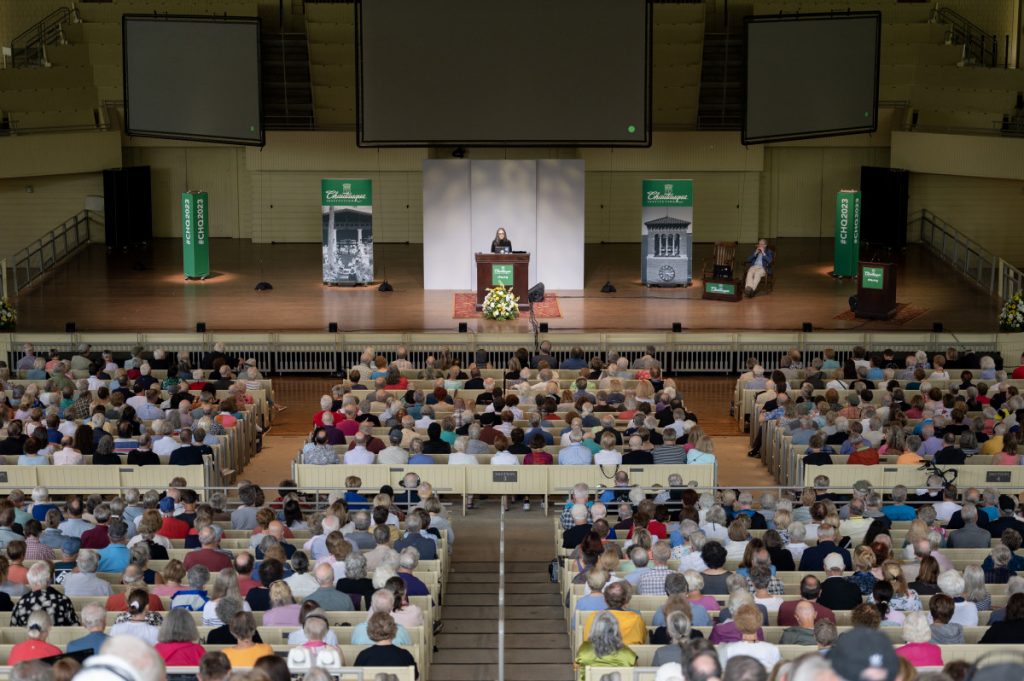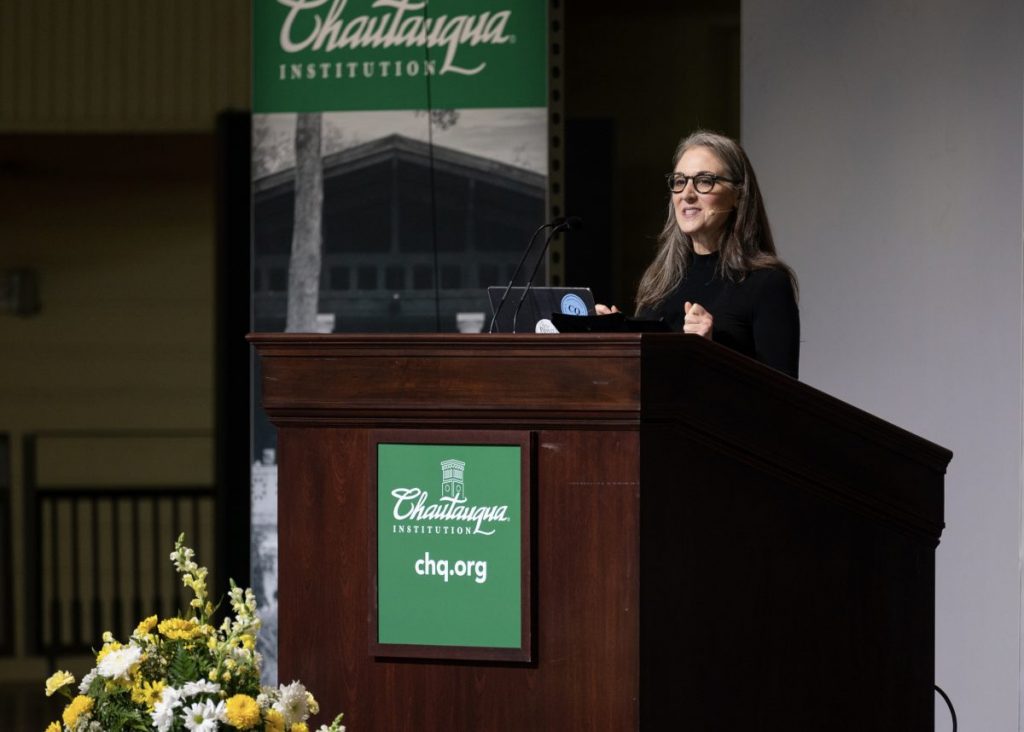
Alton Northup
Staff writer
Rather than a national divorce, the United States may need to renew its vows.
“I started my career with a focus on marriage counseling,” said psychologist, researcher and writer Pamela Paresky. “The habits necessary for a flourishing liberal democracy are some of the same habits necessary for a happy marriage.”
Paresky, director of the Aspen Center for Human Development and creator of the project “Habits of a Free Mind: Psychology for Democracy and The Good Life,” continued the Chautauqua Lecture Series Week Eight theme, “Freedom of Expression, Imagination, and the Resilience of Democracy,” at 10:45 a.m. Wednesday in the Amphitheater. She examined the problems and virtues of marriages and how they apply to democracy.
“One thing that’s not an indication of a bad marriage is arguing,” she said. “When you have decisions to make, two heads are better than one.”
Understanding the ultimate concerns, as existential psychiatrist Irvin Yalom put it, are at the core of spousal arguments. However, Paresky said many couples are not aware of this, and once they separate, they often blame the obstacles that sit above the surface of these concerns.
Communication problems in a relationship can lead to feelings of misunderstanding and misinterpretation, she said. When couples fail to communicate, they may make accurate guesses about each other, but over time they’ll just make up stories.
The same, she said, is true for democracy.
“When we don’t understand people with whom we disagree, just like with spouses, we make up stories about them in our minds,” Paresky said. “Just like in a bad marriage, it becomes impossible to have a shared reality.”
In a poll by More in Common, Democratic Party voters indicated that only 35% of Republican Party voters believe Americans have a responsibility to learn from the past and fix mistakes. In reality, the poll found that 93% of GOP voters held that belief.
“When we don’t pay attention to whole groups of people, and especially if we think we know them, we miss important information,” she said. “Sometimes we just stop noticing them at all.”
When someone no longer feels noticed in a relationship they seek other means, such as social media, to fulfill their need for appreciation. Paresky said this leads to a lack of trust.
A marriage without trust is also one without compromise, she said. When one side cannot trust the other will compromise, or even play by the rules, it creates an incentive to quit the game. In marriage, this pulls spouses apart; in politics, it pulls parties apart.
“Marriages disintegrate without trust and so do democracies,” she said.
Paresky labeled the tendency for partisans to distrust those in the other party as affective polarization, and she said it has been growing for decades. Just as in marriage, this distrust makes intimacy difficult.
“Emotional intimacy is a profound revelation of self,” Paresky said. “When people aren’t willing to be vulnerable, when they’re unwilling to risk being hurt or authentically known, intimacy isn’t possible.”

In marriages, intimacy can look like sexual relations, but in democracy it is as simple as sitting down for a cup of coffee with someone from an opposing party. However, conversations across the aisle have become increasingly difficult.
According to one study she shared, 15% of Republican voters and 20% of Democratic voters believed the country would be better off if large numbers of opposing partisans died. Additionally, more than 70% of Americans see the opposing party as brainwashed.
The communication problem has fed into a trust problem, that then created an intimacy problem and spiraled into a contempt problem.
“In democracy, as in marriage, contempt is an acid that dissolves the bonds of affection,” Paresky said. “Regardless of which side we’re on, we’ve come to see the other side as so illegitimate that working together seems not merely pointless, but morally repugnant.”
The United States has a crisis of meaning, she concluded. The purpose of a cross-partisan relationship must be internally derived to be valuable, because an externally derived relationship cannot hold.
In marriage, an externally derived relationship can be staying together for the kids. This may make for great parents, she said, but it will not make for a great marriage.
“We’re in a situationship, and the tethers are fraying,” she said.
Success in democracy and marriage means acknowledging common goals, which requires strengthening the habits of the free mind: candor, courage, curiosity, compromise, compassion, calling and commitment. Each of these virtues comes with a mantra.
For candor, it is “here’s what I really think.” However, Paresky said while people still need to say what they think, it should be candor with consideration.
“In a good marriage, we attack problems — not spouses,” she said. “In a flourishing democracy, we attack ideas — not people.”
Citizens of a democracy should protect the character and civil liberties of others, even if they disagree.
To do this one needs courage. The mantra of courage is “you can count on me.”
Democracy relies on a free speech culture, she said, where people neither fear words nor condone harassment. One year after the attack on Salman Rushdie, she said Chautauqua exemplifies this virtue.
“It’s a testament to President (Michael) Hill and to the mission of Chautauqua Institution and to the strength of the community all of you have built that one year later we’re here for a week of sessions about freedom of speech,” she said. “If we’re too afraid to defend people who articulate opinions we ourselves hold, how will we summon the courage to defend free speech when people say things we don’t like?”
Curiosity’s mantra is “what am I missing?” and “what’s the story I’m telling myself?”
Being a good listener isn’t counterproductive to being a good debater, Paresky said. It’s actually essential — but there’s a key difference in a debater’s listening, which is done for “performative conversation,” and the listening that must be done in intimate conversations.
“Debate is essential to a flourishing democracy,” she said, “but that’s not the kind of listening that makes people feel like they matter.”
At the same time, people often assume they know more about a person than they really do. Because of this, people may ignore a crucial piece of information because it does not fit into their preconceived notions.
“The stories we tell ourselves shape what we notice,” she said.
The mantra for compromise is not a question, but a promise. It is “you can trust me.” Trust is all about repairing what was broken. Seeking compromise rather than trying to win at all costs, and standing up for others, can end the cycle of affective polarization, she said.
Having compassion is the opposite of contempt and “relies on our common humanity.” Its mantra is “you belong here,” and that four-letter word carries a lot of meaning.
“ ‘Here’ is a mystical place,” Paresky said. “Our sense of ‘here’ can be so small that that person sitting next to you can be ‘there,’ or it can be so large that everyone in the Amphitheater can be ‘here.’ ‘Here’ is a place for us, and ‘there’ is a place for them.”
The sixth habit is one of calling, and its mantra is “You matter to me.”
A calling is not a purpose, but a question. And how one leads their life is the answer. Paresky said what really matters in life is one’s relations with other people.
“Ultimately, a life worth living leads us to other people,” she said.
The final habit of the free mind is commitment. There are no easy answers to hard questions, and there are no simple solutions to wicked problems, Paresky said. But if society is committed to a liberal democracy, then a divorce is not an option.
Because of this, commitment’s mantra is “how will we solve wicked problems?”
Paresky’s answer: Together.




